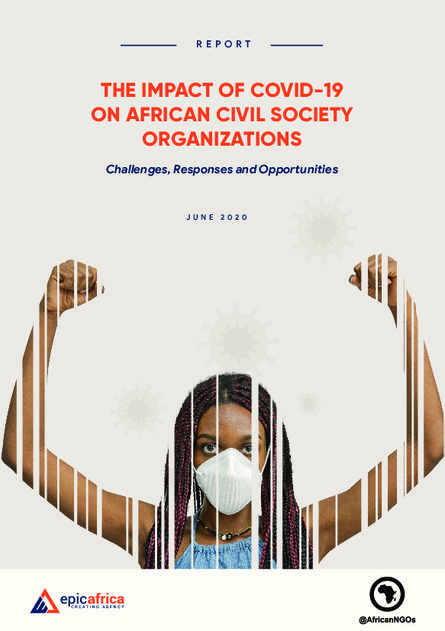
The immediate impact of COVID-19 on African civil society organisations (CSOs) was swift, widespread and destabilizing. This is one of the main findings of the Africa CSO COVID-19 Survey that @AfricanNGOs and EPIC-Africa implemented between 28 April and 15 May 2020. A total of 1 015 CSOs from 44 African countries participated in the survey.
Based on the survey findings, we are pleased to release, “The Impact of COVID-19 on African Civil Society Organizations – Challenges, Responses and Opportunities”, the first report that focuses exclusively on the impact of COVID-19 on African CSOs.
It presents an overview of the dual challenges confronting African CSOs of keeping their organizations afloat, while also responding to the needs of the communities in which they operate. It also highlights opportunities that emerged from the crisis, and crucial challenges that need to be addressed in support of the recovery and sustainability of African CSOs.
The report fills a critical knowledge gap and offers funders, governments, the private sector and other strategic stakeholders the necessary data-based evidence to inform their engagement with African CSOs, both during and after the pandemic. It also provides CSOs with a tool to help strengthen solidarity and inform advocacy for greater recognition and support for the sector.
Some of the key findings from the survey include:
98% of respondents confirmed that they had been adversely affected;
55.69% has already experienced a loss of funding, while 66.46% expect to lose funding in the next 3 to 6 months;
49.87% have introduced measures to reduce costs because of the loss of funding, or the uncertainty about future funding;
77.97% of respondents indicated that COVID-19 would have a devastating impact on the sustainability of many CSOs.
The majority of respondents (84.48%) confirmed that they were not prepared to cope with the disruption caused by the pandemic. 69.34% had to reduce or cancel their operations, while 54.94% expect this to continue over the next 3 to 6 months.
Adding to the challenges facing CSOs, they are also not receiving the necessary support from national governments. In addition to excluding CSOs from emergency funding mechanisms, 71.58% of respondents believed that governments had failed to recognize and utilize local CSOs’ skills, experience and networks in response to COVID-19.
Despite the impact on their operations, African CSOs have been at the forefront of the response to COVID-19. 84.77% of respondents introduced new program activities, with 71.94% self-funding these activities. 85.47% stated that they could have done more if capacity or funding constraints were not a barrier.
African CSOs are also demonstrating resilience and agility as they adapt to changing circumstances. They have identified some key opportunities as they seek to cope with the pandemic. These include leveraging domestic funding sources, building sector solidarity and accelerating digital transformation.
It is still too early to comprehend the full impact of COVID-19 on African CSOs, especially as the pandemic is still spreading. However, the impact will be long-lasting as COVID-19 has exacerbated historical and ongoing challenges that hamper the sector. If left unattended, a significant number of CSOs will close down, people working in the sector will lose their jobs, and the various constituencies that depend on CSOs’ services and advocacy interventions will suffer the consequences.
Still, many CSOs remain optimistic about the future. 45.06% of respondents felt that they would emerge stronger and more agile after the pandemic, while 68.08% felt that COVID-19 would result in greater public appreciation for their work.
@AfricanNGOs and EPIC-Africa will implement a follow-up survey in late 2020 to assess the evolving impact of COVID-19 on African CSOs.